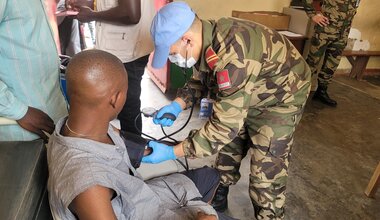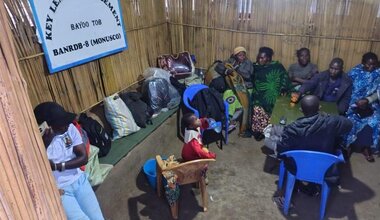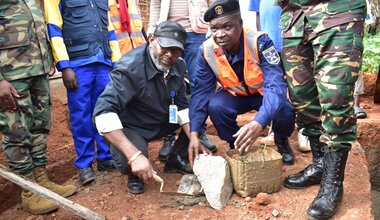Support local communities in fighting poverty in Equateur
Purchase for Progress (P4P) is a joint programme of the World Food Programme (WFP) and the United Nations Food and Agriculture Organization (FAO) aimed at reviving the agricultural economy by helping small producers increase their production and sell at fair prices as to increase their income.
An innovative approach
Meissa Aw coordinates the P4P project for the Equateur Province: ‘‘The project started in late 2011 in the territory of Bikoro and expanded to the territory of Ingende in 2014. The project targets 3000 and 4000 beneficiaries in each territory respectively. P4P is also implemented in Kabalo, in Katanga province,’’ he explains. In the Democratic Republic of the Congo (DRC), one of the main features of P4P is to restore the commercial networks by offering opportunities for small producers and by making them more competitive. ‘‘WFP, which is in charge of coordination, is involved not only in the marketing of food but also buys from the unions and organizations of small producers involved in the project,” adds Meissa. “The products they buy are used for food assistance programmes, such as assistance to refugees from the Central African Republic and internally displaced people, food for school canteens and for the WFP’s “food-for-work” activities.”
In five years, the project has already achieved concrete results and had a positive impact on the socio-economic situation of the beneficiaries in the areas of intervention: ‘‘In the Equateur province for example, P4P has contributed to the creation of 294 farmers’ organizations (FOs) and 17 unions whose legal recognition is underway,’’ says Meissa. ‘‘The project is also strengthening producer capacity through training, support to agricultural inputs, market infrastructure, construction of warehouses and shelters, rehabilitation of rural roads, and acquisition of processing units (mills and hulling).’’
The gender component
Since a large number of small producers are women, P4P also emphasizes the importance of gender issues and equality, particularly in areas where the empowerment of women is problematic. The project focuses on a balanced approach promoting women in all project activities and ensuring that women and men have equal access to land, seeds, fertilizers, technology, transportation, markets and support services. Thanks to the activities focused on gender, women’s participation in project activities increased from about 15% in 2009-2010 to over 32% today. “Among the women with whom we work, 37% are leaders in management and decision-making bodies within the FO and the unions and 97% of the learners in the literacy program initiated in Equator by the P4P are women,’’ commented Meissa. ‘‘P4P also conducts capacity building activities in vegetable growing for women farmers and has set up a series of lively community radio programmes broadcasted by women on topics that appeal to women such as access to land, the right to a household income, early marriage, child education, etc.”
A Senegalese national, Meissa is an agricultural economist by training and has focused his career on the area of rural development and food security: ‘‘I have worked with small farmers in Senegal and gained experience in project coordination with donors, local authorities and with producers’ associations.’’ Meissa reiterates his commitment and determination to assist producers in achieving one of the United Nations Millenium Development Goals, the reduction of poverty, ‘‘which impact is more evident in the rural world, where 93% of the population lives below the poverty line,” says Meissa. ‘‘With an area that exceeds western Europe, comprised of more than 120 million hectares of land suitable for agriculture, the DRC has enormous potential because of the fertile land which does not require fertilizer.’’ For Meissa, his contribution as a United Nations Volunteer is using his skills and knowledge to help small producers in P4P projects to fight against poverty. ‘‘Volunteering made me fulfill a childhood dream: I lived in the DRC for six years as a kid and I wanted to come back and put my skills to use by helping small producers to improve their agricultural ways and, therefore, their socio-economic situation.’’
 UN
UN United Nations Peacekeeping
United Nations Peacekeeping





